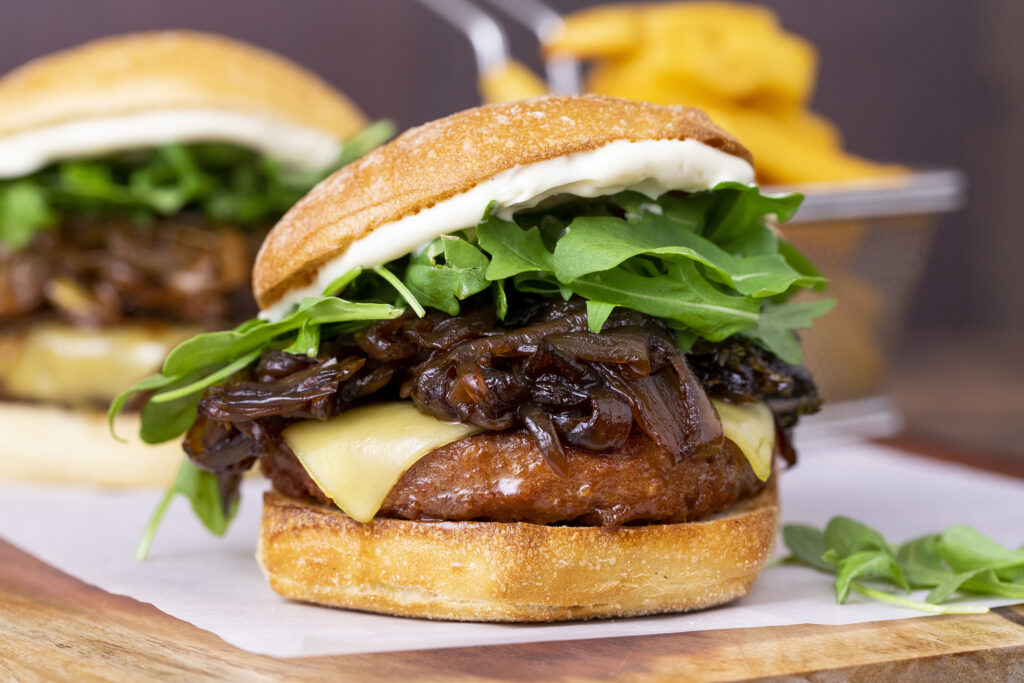European Parliament REJECTS veggie burger ban, but ‘ties the hands’ of plant-based dairy
23 October 2020
Members of the European Parliament today rejected plans to ban companies from using terms like ‘burger’ and ‘steak’ for plant-based products – but “tied the hands” of plant-based dairy producers as they backed a clampdown on descriptors like ‘cheese-style’.

Members of the European Parliament today rejected plans to ban companies from using terms like ‘burger’ and ‘steak’ for plant-based products – but “tied the hands” of plant-based dairy producers as they backed a clampdown on descriptors like ‘cheese-style’.
A majority of MEPs rejected all versions of the proposed restrictions, after leading NGOs, businesses and thousands of consumers opposed them. However, a majority voted in favour of a ban on companies using terms like ‘cheese-style’ and ‘butter alternative’ to describe plant-based dairy products, under a proposal that could also prevent companies from using packaging styles such as butter blocks and milk cartons.
This decision is still subject to the Parliament voting in favour of the entire Common Agricultural Policy reforms in their entirety, with results announced at 5pm CET today. If carried, the plant-based dairy restrictions will be subject to negotiations with the Council of the EU and the European Commission.
The Good Food Institute Europe, a nonprofit working to accelerate plant-based and cultivated proteins, called on national leaders on the Council of the EU to “clear up this mess” and reject restrictions on plant-based dairy products.
A majority of MEPs rejected all versions of the proposed restrictions on ‘meaty’ terms for plant-based foods at a plenary vote this morning, after opposition from leading nonprofits, businesses and hundreds of thousands of consumers.
The proposed amendments to the Common Agricultural Policy would have effectively banned widely accepted and commonly used terms such as ‘veggie burger’ or ‘plant-based steak’.
National leaders must ‘clear up this mess’
The Good Food Institute Europe’s policy manager Elena Walden said: “If this vote is confirmed later, the European Parliament has finally taken the ridiculous veggie burger ban off the table. This decision should bring an end to the imaginary crisis of consumer confusion over plant-based food. But it’s baffling that, at the same time, MEPs have tied the hands of the already-restricted plant-based dairy sector.
“Terms like ‘milk’ and ‘cheese’ are already banned for products made from plants, but this vote could forbid helpful descriptors like ‘yoghurt-style’ and ‘butter alternative’ – further undermining the EU’s sustainability commitments.
“National leaders on the Council of the EU must clear up this mess and reject confusing and unnecessary restrictions on plant-based dairy products.”
Why the veggie burger ban fell
The result comes after 13 international environmental, animal welfare and food safety groups wrote to MEPs arguing that the restrictions would contradict the EU’s climate change commitments, and its Farm to Fork strategy. A separate open letter signed by 50 businesses and nonprofits to MEPs also argued that the plans breached the bloc’s principle of proportionality.
Animal agriculture is responsible for 12-17% of the EU’s greenhouse gas emissions, and studies show that moving toward plant-based meat would reduce emissions by 30-90%. According to the EU Commission, the markets for meat and dairy alternatives are experiencing annual growth rates of 14% and 11%, respectively.
European consumers overwhelmingly favour the use of meat-related terms for plant-based foods. A recent survey conducted by the European Consumer Organisation (BEUC) in 10 member states found that more than 68% of consumers support labels such as burger and steak for plant-based food, as long as the products are clearly labelled as plant-based or vegetarian. Over 250,000 people also signed a petition against the proposed restrictions.
While the exact proposals around ‘meaty’ terms voted on today are unlikely to resurface, some European countries are considering restrictions on the plant-based sector at the national level, and France has already introduced a ban on common ‘meaty’ terms for plant-based food.
